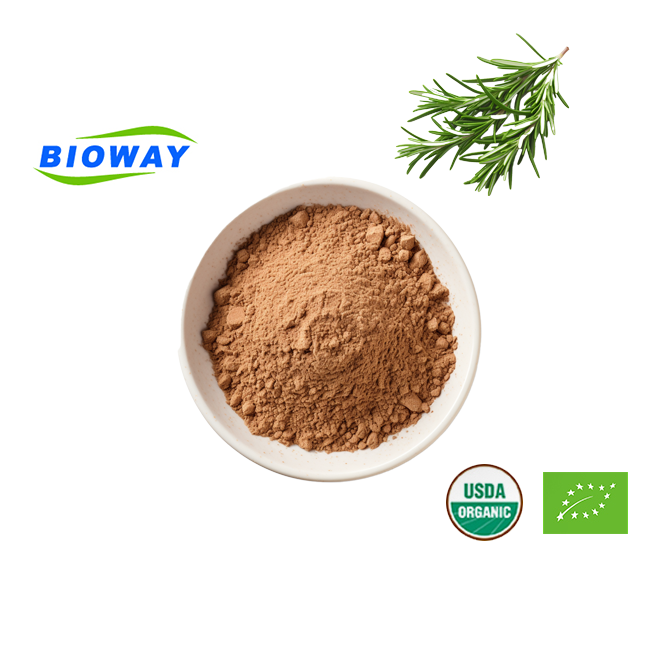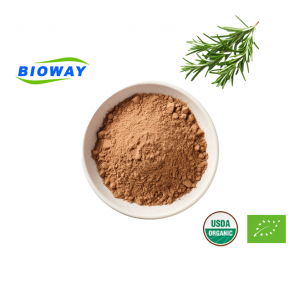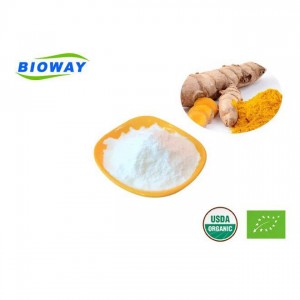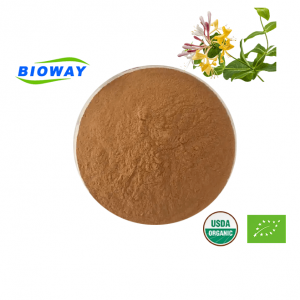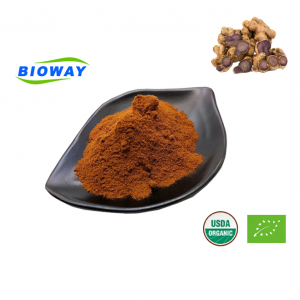Rosemary Leaf Extract
Rosemary leaf extract is a natural extract derived from the leaves of the rosemary plant, scientifically known as Rosmarinus officinalis. This extract is typically obtained through an extraction process using solvents such as ethanol or water. It is known for its potential health benefits and is often used in various industries, including food, cosmetic, and pharmaceutical industries.
This leaf extract contains bioactive compounds such as rosmarinic acid, carnosic acid, and carnosol, which have antioxidant, anti-inflammatory, and antimicrobial properties. It is often used as a natural preservative in food products, as well as an ingredient in skincare and hair care products due to its reported antimicrobial and antioxidant effects.
In the food industry, rosemary leaf extract is utilized as a natural antioxidant to extend the shelf life of various food products. In the cosmetic industry, it is incorporated into skincare and hair care formulations for its potential skin benefits and preservative properties. Contact us for more information: grace@biowaycn.com.
| Product Name | Rosemary leaf Extract |
| Appearance | brown yellow powder |
| Plant Origin | Rosmarinus officinalis L |
| CAS No. | 80225-53-2 |
| Molecular Formula | C18H16O8 |
| Molecular Weight | 360.33 |
| Specification | 5%, 10%, 20%, 50% ,60% |
| Test Method | HPLC |
| Product name | Organic Rosemary leaf extract | standard | 2.5% |
| Manufacturing Date | 3/7/2020 | Batch No) | RA20200307 |
| Date of analysis | 4/1/2020 | Quantity | 500kg |
| Part Used | Leaf | Extract Solvent | water |
| Item | Specification | Result | Test Method |
| Maker Compounds | (Rosmarinic acid)≥2.5% | 2.57% | HPLC |
| Color | Light brown powder | Conforms | Visual |
| Odor | characteristic | Conforms | Organoleptic |
| Particle Size | 98% through 80 mesh screen | Conforms | Visual |
| Loss on Drying | ≤5.0% | 2.58% | GB 5009.3-2016 |
| Total Heavy Metals | ≤10PPM | ≤10PPM | GB5009.74 |
| (Pb) | ≤1PPM | 0.15PPM | AAS |
| (As) | ≤2PPM | 0.46PPM | AFS |
| (Hg) | ≤0.1PPM | 0.014PPM | AFS |
| (Cd) | ≤0.5PPM | 0.080PPM | AAS |
| (Total Plate Count) | ≤3000cfu/g | <10cfu/g | GB 4789.2-2016 |
| (Total Yeast&Mold) | ≤100cfu/g | <10cfu/g | GB 4789.15-2016 |
| (E.Coli) | (Negative) | (Negative) | GB 4789.3-2016 |
| (Salmonella) | (Negative) | (Negative) | GB 4789.4-2016 |
| Standard: Complies with the enterprise standard | |||
Rosemary leaf extract is a popular herbal product with various features and characteristics. Here are some key aspects to consider:
Aromatic: It is known for its distinctive aromatic fragrance, which is often described as herbal, woody, and slightly floral.
Antioxidant-rich: The extract is rich in antioxidants, which may provide potential health benefits, including protection against free radicals.
Versatile: It can be used in a wide range of applications, including dietary supplements, skincare products, hair care products, and culinary uses.
Extraction methods: It is typically produced through extraction methods such as steam distillation or solvent extraction to capture the beneficial compounds found in the plant.
Quality control: High-quality production involves careful selection of raw materials, adherence to international Practices, and rigorous quality control measures to ensure purity and potency.
Health benefits: The extract is marketed for its potential health-promoting properties, such as antioxidant support, cognitive enhancement, and skincare benefits.
Natural origin: Consumers are often drawn to rosemary leaf extract for its natural origins and traditional uses.
Versatility: The extract's ability to be incorporated into various products makes it appealing for manufacturers looking to enhance the properties of their offerings.
Here are a few notable health benefits associated with rosemary leaf extract:
Antioxidant properties: It contains compounds, such as rosmarinic acid, carnosic acid, and carnosol, which act as antioxidants. These antioxidants may help protect the body's cells from damage caused by free radicals, which are unstable molecules that can contribute to the aging process and various diseases.
Anti-inflammatory effects: Some studies suggest that the bioactive compounds in rosemary extract may possess anti-inflammatory properties, which could potentially help reduce inflammation in the body. Chronic inflammation is linked to various health conditions, so the anti-inflammatory effects of rosemary leaf extract may have protective effects.
Antimicrobial activity: It has been shown to exhibit antimicrobial properties, which may help inhibit the growth of certain bacteria and fungi. This property makes it a popular ingredient in natural preservatives for food and cosmetic products.
Cognitive support: There is some evidence to suggest that certain components of this extract may have cognitive-enhancing effects. For example, aromatherapy using rosemary essential oil has been studied for its potential to improve cognitive function and memory.
Skin and hair benefits: When used in skincare and hair care products, it may offer benefits such as antioxidant protection, antimicrobial action, and potential support for scalp health.
Rosemary leaf extract is used in various industries, including:
Food and beverage: Rosemary extract is commonly used as a natural preservative due to its antioxidant properties. It can help extend the shelf life of food products and prevent oxidation, particularly in oils and fats. Additionally, it is used as a natural flavoring and can impart a distinct aroma and taste to foods and beverages.
Pharmaceuticals: The extract is utilized in pharmaceutical formulations for its potential health benefits, including anti-inflammatory and antimicrobial properties. It may be included in topical preparations, supplements, and herbal remedies.
Cosmetics and personal care: Rosemary extract is sought after for its antioxidant and anti-inflammatory properties, making it a popular ingredient in skincare, hair care, and cosmetic products. It can contribute to the preservation of natural beauty and skin health.
Nutraceuticals and dietary supplements: Rosemary extract is often included in dietary supplements for its potential health-promoting properties. It may be used in formulations targeting cognitive health, antioxidant support, and overall wellness.
Agriculture and horticulture: In agriculture, rosemary extract can be used as a natural pesticide and insect repellent. It may also have applications in organic and sustainable farming practices.
Animal feed and pet products: The extract can be added to animal feed and pet products to provide antioxidant support and potentially promote overall health in animals.
Fragrance and aromatherapy: Rosemary extract, particularly in the form of essential oil, is utilized in fragrances and aromatherapy products due to its invigorating and herbaceous scent.
Overall, the diverse properties of rosemary leaf extract make it a valuable ingredient across a range of industries, contributing to product quality, functionality, and potential health benefits.
Here's a brief overview of the typical flow chart for the production process:
Harvesting: The first step involves carefully harvesting fresh rosemary leaves from the plant. Selecting high-quality leaves is essential for obtaining a potent and pure extract.
Washing: The harvested leaves are then washed thoroughly to remove any dirt, debris, or contaminants. This step is crucial for ensuring the cleanliness and purity of the extract.
Drying: The washed leaves are dried using methods such as air drying or dehydration. Drying the leaves helps preserve their active compounds and prevents mold or spoilage.
Grinding: Once the leaves are fully dried, they are ground into a coarse powder using grinding equipment. This step increases the surface area of the leaves, facilitating the extraction process.
Extraction: The ground rosemary leaf powder is then subjected to an extraction process, typically using a solvent such as ethanol or supercritical carbon dioxide. This extraction process helps to isolate the desired active compounds from the plant material.
Filtration: The extracted solution is filtered to remove any remaining plant material and impurities, resulting in a more refined extract.
Concentration: The filtered extract is then concentrated to increase the potency and concentration of active compounds. This step may involve processes such as evaporation or distillation to remove the solvent and concentrate the extract.
Drying and Powdering: The concentrated extract is subjected to drying processes, such as spray drying or freeze drying, to remove any remaining moisture and convert it into a powder form.
Quality Control: Throughout the production process, quality control measures are implemented to ensure the purity, potency, and safety of the extract powder. This may involve testing for active compounds, microbial contaminants, and heavy metals.
Packaging: Once the extract powder has been produced and tested, it is packaged into appropriate containers, such as sealed bags or containers, to protect it from moisture, light, and air.
The specific details of the production process can vary based on the manufacturer and the desired specifications of the extract powder. Additionally, adherence to industry standards and regulations, as well as good manufacturing practices, is essential to ensure the quality and safety of the final product.
Storage: Keep in a cool, dry, and clean place, Protect from moisture and direct light.
Bulk Package: 25kg/drum.
Lead Time: 7 days after your order.
Shelf Life: 2 years.
Remark: Customized specifications also can be achieved.
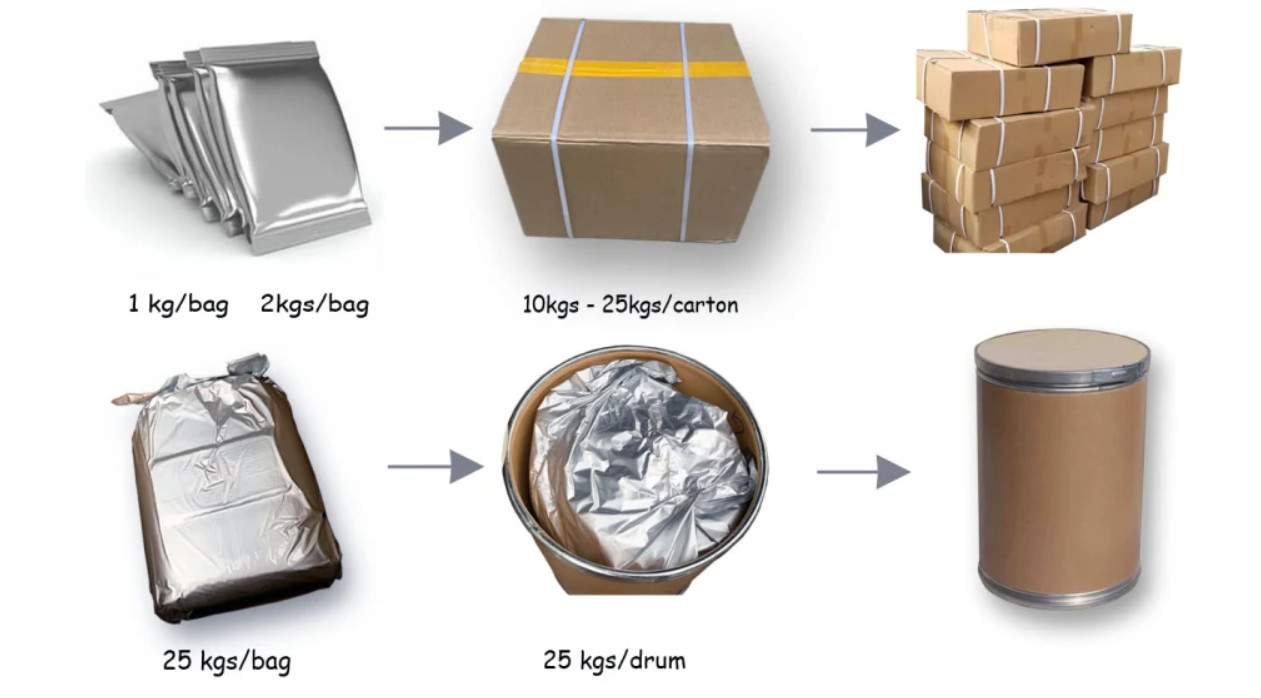
Express
Under 100kg, 3-5Days
Door to door service easy to pick up the goods
By Sea
Over300kg, Around 30 Days
Port to port service professional clearance broker needed
By Air
100kg-1000kg, 5-7Days
Airport to airport service professional clearance broker needed

Rosemary Leaf Extract Powder is certified by ISO, HALAL, and KOSHER certificates.

Both rosemary essential oil and rosemary extract have their own unique properties and potential benefits. Rosemary essential oil is known for its potent aroma and concentrated nature, while rosemary extract is valued for its antioxidant properties and potential health benefits. The effectiveness of each product can vary depending on the specific application and desired outcome.
Rosemary essential oil contains high concentrations of volatile compounds that contribute to its characteristic aroma and potential therapeutic effects. It is commonly used in aromatherapy, topical applications, and natural cleaning products due to its refreshing scent and potential antimicrobial properties.
On the other hand, rosemary extract, often derived from the leaves of the plant, contains compounds such as rosmarinic acid, carnosic acid, and other polyphenols with potent antioxidant properties. These antioxidants are known to help protect cells from oxidative stress, which is linked to various health benefits, such as supporting cardiovascular health and overall well-being.
Ultimately, the choice between rosemary essential oil and rosemary extract may depend on the specific purpose, application, and desired benefits. Both products can be valuable additions to a natural health and wellness routine, but it's important to consider individual preferences, usage guidelines, and any potential contraindications before incorporating them into daily use.
For hair growth, rosemary oil is generally considered more effective than rosemary water. Rosemary oil contains concentrated extracts of the herb, which can provide more potent benefits for promoting hair growth and improving scalp health. When using rosemary oil for hair growth, it's often recommended to dilute it with a carrier oil before applying it to the scalp.
On the other hand, rosemary water, while still beneficial, may not provide the same level of concentrated active compounds as rosemary oil. It can still be used as a hair rinse or spray to support scalp health and overall hair condition, but for targeted hair growth benefits, rosemary oil is often preferred.
Ultimately, both rosemary oil and rosemary water can be beneficial for hair health, but if your primary goal is hair growth, using rosemary oil may yield more noticeable and targeted results.
When choosing between rosemary extract oil, extract water, or extract powder, consider the intended use and application. Here's a brief overview to help you decide:
Rosemary Extract Oil: Ideal for use in oil-based products such as massage oils, hair oils, and serums. It can also be used in cooking or baking for flavor and aroma.
Rosemary Extract Water: Suitable for use in various skincare products, such as toners, mists, and facial sprays. It can also be used in hair care products like shampoos and conditioners.
Rosemary Extract Powder: Often used in the formulation of powdered supplements, cosmetics, or dry food products. It can also be used in making herbal teas or encapsulated as a dietary supplement.
Consider the formulation compatibility, desired potency, and intended product format when making your choice. Each form of rosemary extract offers unique benefits and properties, so select the one that aligns with your specific requirements.





